Russia - the beginning of the state
This article will focus on the process of formation of early pre-state or potestary institutions and the factors behind their emergence in Eastern Europe.
Entry
At the turn of the XNUMXth - XNUMXth centuries. the unification of the tribes of Eastern Europe under the rule of the Russian clan took place, which marked the beginning of tectonic changes among the East Slavic tribes. This power for most of the tribal unions remained external and consisted only of tributes. Polyudye, most likely, was used only outside the territory of the “domain” of Rus. With the formation of a super-union of all tribes conquered by Russia, the formation of a squad takes place - as a military-police instrument standing above the tribal structures. Until that time, no squad among the tribal collectives of the Slavs did not exist. The prince becomes not only a military leader, but also the head of public authority.
This is not a monarchy or an early monarchy; there are still many centuries before its emergence in Russia.
Only the first pre-state and public supra-tribal institutions are emerging.
All European peoples at this stage of development were characterized by military expansion in order to seize wealth and slaves for glory and prestige:
Russia is drawing the tribes of Eastern Europe into long-distance campaigns for riches and tribute. Princes Oleg, Igor, Svyatoslav collect huge tribal militias for campaigns against Constantinople, Khazars and other neighbors. Rus makes raids-campaigns on the cities located on the Caspian Sea. Svyatoslav is fighting for Bulgaria with Byzantium. The heroic period of Svyatoslav enriched our history such catchphrases as
And to the proposal of the emperor of Byzantium John of Tzimiskes to resolve the dispute between the peoples by a duel, Svyatoslav honorably "worked out the objection", answering
Russia does not stop strengthening its power, waging wars for tribute against the opposing tribes of Eastern Europe. Every time after the death of the "great" Russian prince, naturally, there was an attempt to free himself.
Prince Igor, after the death of Oleg, again returns to the submission of the Drevlyans. He is killed in 945 by the Drevlyan tributaries, and Olga destroys the tribal nobility of the Drevlyans, including them in the Russian "domain". In 947 she set up graveyards along Msta and Luga, strengthening, as they would say today, the administrative supervision of the tributaries: Vody and all, Finno-Ugric tribes.
Prince Vladimir again conquered the Vyatichi, subordinate to his father, Prince Svyatoslav, however, they are fighting the Russian princes until the end of the 984th century. In XNUMX, the governor of Vladimir, Wolf Tail, defeated the Radimichs, conquered by the same Svyatoslav.
Everything that was captured in the raids and campaigns for tribute was obtained in the polyudye, the Rus were sold in different markets: "furs and wax, honey and slaves."
Trade and genus
An important component of the activities of the Rus were trade campaigns to Byzantium, Khazaria, Volga Bulgaria and further to the East. In the Middle Ages, long-distance trade was not the lot of individuals who "traveled" along different paths, but the business of squads and princes. Long-distance trade was an extremely rare and dangerous enterprise; Prince Svyatoslav himself could not break through the ambushes of the Pechenegs at the Dnieper rapids. Konstantin Porphyrogenitus writes about the same attacks during the drag, the Rus, attacked by the Khazars, after the march to the Caspian Sea, found themselves in the same situation.
During this period, no one traveled back and forth along the path "from the Varangians to the Greeks" or along other, similar routes, "from the Varangians to the Bulgars" or "from the Varangians to the Germans", outside the armed caravan of ships organized by such strong structures as Russian genus.
Without understanding the psychology and mentality of the people of the early Russian Middle Ages, it will be very difficult for a modern person to understand the events of this period.
A man of a tribal period, like a small child, lived in a real and at the same time mythical world, where reality and "dreams", everything was mixed. Formidable warriors stepped up in front of mysticism, like the prophetic Oleg in the situation with a horse, sung in a poem by A.S. Pushkin.
Inanimate objects and beasts could act like intelligent creatures.
In such an environment, the clan was the only structure for the existence and protection of the individual, both from otherworldly forces and from the dangers of the surrounding world, the institution of blood feud provided this protection.
And the primitive economy had an absolute agrarian-consumer character, the land was a common property, inseparable from the clan, perhaps with its death. These ideas were illuminated by the unshakable sacred laws associated with the cosmography of a person, which was based on generic being. That is, a positive world order was seen as a family structure, and the structure and economy of a family were determined by such a vision of the world order.
Wealth was not a means of accumulation and acquisition. Coins, precious metals, jewelry obtained in the course of exchange ("trade") or war were, first of all: first of all, objects of sacrifice to gods or deities, secondly, objects of prestige, and only last of all objects of accumulation. The overwhelming majority of treasures in Eastern Europe were buried either in places from which it was impossible to extract them, or in the field, that is, they were not treasures hidden from enemies or thieves, although, of course, there were such, but sacrifices to the gods.
From the point of view of the material value of things, the exchange was not rational. Wealth meant the ability of its owner to give gifts to people dependent on him, for example, a squad, to arrange feasts for the entire community.
A strong, noble person, a leader was judged precisely by these qualities. The more generously the prince, boyar or noble man distributes wealth, the higher his status, the more knights and heroes he has in the squad.
This explains why the Rus merchants, according to Muslim writers, exchanged furs and slaves for glass beads for their wives. Prince Igor goes with a small squad on a dangerous campaign in the Drevlyansky land, because his squad is "naked and bare", and Prince Svyatoslav takes tribute from the Byzantines for the dead, for their family!
Prince Vladimir arranges city-wide feasts, thereby redistributing the surplus product, in modern terms, more evenly among the members of the Polyan community in Kiev.
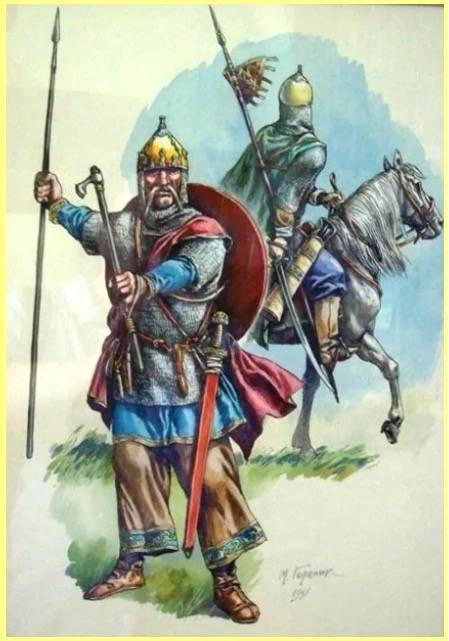
M. Gorelik. Reconstruction of Russia. State Historical Museum. Moscow. Photo by the author
We should not be misled by formally borrowed institutions and terms from neighboring, more developed peoples, such as Khazaria or Byzantium. It was a form without the content that these states had (money, titles, etc.). So, Prince Vladimir is called the Russian Khagan by analogy with the Khazars.
Chasing Vladimir's silver coins from the same series as his casting silver spoons for the squad. They were just imitations, not full-fledged coins. Imitation, which is so important for all societies at this stage of development, for many peoples of all countries and continents.
Franks VI - VII centuries. under the Merovingians, the period of "military democracy", the Byzantine solidi were copied in detail as a sign of prestige and sovereignty, and not monetary exchange.
And here I would like to once again draw attention to the fact that the land had no value as such, that is, there is no need to talk about any early feudalism or the like - the most important riches were only treasures and attributes of military valor and glory. I will consider the problem of feudalism and modern interpretations of this period in more detail in a separate work.
The princes had villages in which they kept and bred horses and hunting birds. Moreover, the number of such farms was minimal. Simply put, if there were land holdings of the "nobility", there would be no one to cultivate them: the population consisted of free communes, slavery was of a patriarchal nature. With the emergence of the supra-tribal structure of the Rus, the slave also became an object of foreign trade and ransom.
There can be no question of any large-scale farming during this period.
The surplus product was formed through military violence: tributes, the seizure of slaves and treasures, and was replenished only by war, and the exchange was external in nature with peoples who produced luxury goods and prestige (weapon, jewelry, clothing, fabrics, wine, fruits), and which could only be obtained through the channels of state trade, as in the case of Byzantium.
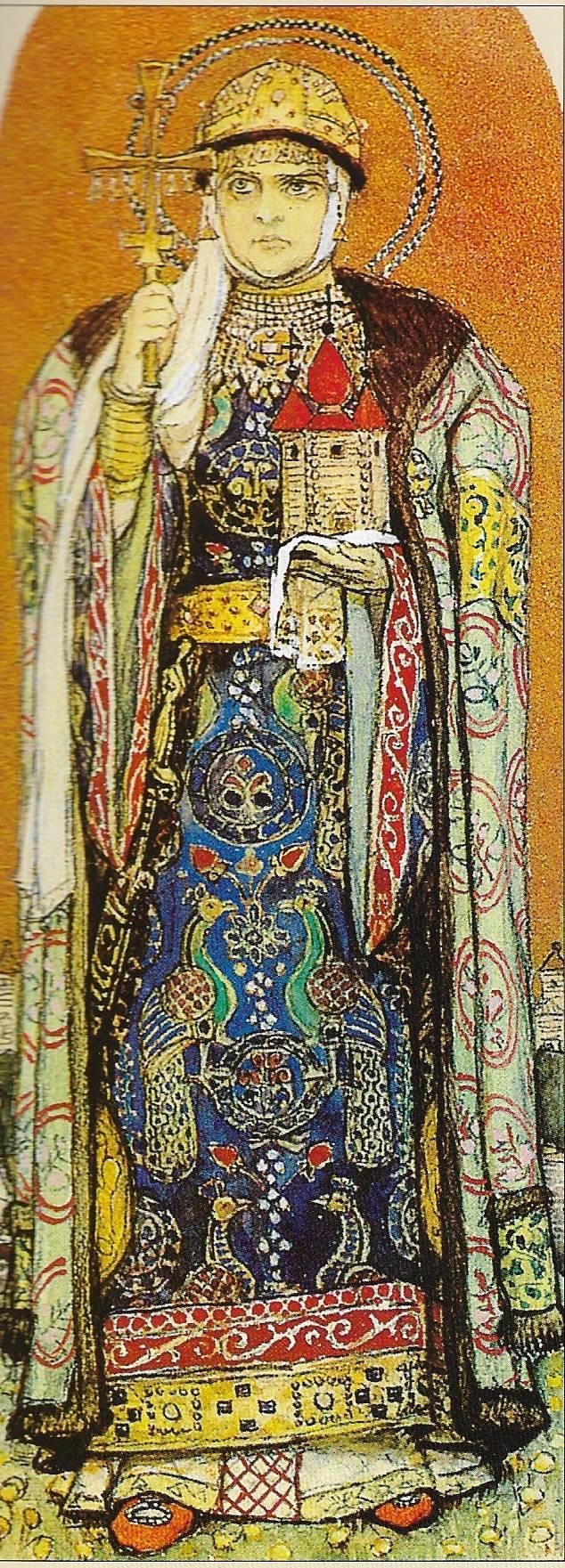
V. Vasnetsov "Princess Olga"
It is the emergence of public power with its own military force (squad) and the involvement of huge masses of people in military enterprises remote from their places of residence, the emergence of wealth and the outlined material stratification of a primitive society - under the influence of these phenomena, the corrosion of the tribal system begins, which develops into a crisis. Family relations are still quite strong, they begin to collapse by the end of the XNUMXth century under the influence of external factors.
The old gods can no longer protect the ancestral foundations; at the same time, potestary institutions are only being formed and are in their infancy.
The Germanic tribes were at the same stage, but in the period preceding the worldwide migration of peoples in the XNUMXth century, which became an impulse for a change in the social structures of the Germans.
The pre-class society of the Germans consisted of free, noble and ordinary members of the community, more and less wealthy, in the absence of private ownership of land. A squad has already emerged from the Germanic tribal society. But she, like slaves, were not the harbingers of the formation of early feudal (class) relations, it was a pre-class society.
After the death of Prince Svyatoslav in 972 at the hands of the Pechenegs, there was not long peace among his sons: during the clashes, Vladimir won, supported by the Slovenes and the Scandinavian Varangians hired for mining.
After the capture of Kiev, Vladimir leads a "heroic" life. He collects tributes from the Lithuanian tribe of the Yatvingians, the White Croats in the Carpathians, and returns the Vyatichi and Radimichi tribes to dependence on Russia. He fights with the Poles and Bulgars (Volga Bulgaria on the territory of modern Tatarstan).
But it is probably no coincidence that immediately after Vladimir captured Kiev, he creates a pantheon of gods, and we come to an important stage in the destruction of the clan system among the Slavic tribes of Eastern Europe.
Embracing Faith: Why and How?
Why? The reason for the adoption of the faith, or the strengthening of the ideological principle on the vast territory of the super-union in Eastern Europe, was the problem of centrifugal tendencies and the threat of the fall of the power of the Kiev Rus over the occupied territories, which did not stop trying to get away from tributary dependence on Russia.
The Slavs were pagans. They worshiped animals (totemism), stones, groves, etc. (fetishism), gods and gods. Each Slavic tribe, by the way, like the Greek tribes of the "heroic" period, and the Scandinavians in the XNUMXth - early XNUMXth centuries, had exclusively tribal gods: the Obodrit, Western Slavs, had Redegast, the Polabs had the goddess Zhiva, Prove at the Vagrs, at the Slovenes of the Ilmen - Volos.
The composition of the pantheon still raises many questions and conflicting conclusions among historians. It is important that regardless of the origin of these deities at this stage, they were all Slavic.
In 981, Vladimir in a pagan temple installed Horst, Stribog, Dazhdbog, Simargl, Makosh and Perun, the god of thunder and the Rus, the ruling clan and the ruling military-social community. Stribog is the main deity of many Slavic tribes, he is also Rod or Svyatovit, Svarog is the ancestor god, the father of Dazhdbog. Dazhdbog - "white light", an analogue of the Greek Apollo. Makosh is a female deity, "mother of the harvest", "mother earth", an analogue of the Greek Demeter. Simargl is the guardian of crops, shoots, he is associated with Makosh and is a messenger between heaven and earth. And Khors is the sun god, analogous to the Greek Helios.
Such a strange and incomprehensible selection can only be explained by the fact that the gods were from the Russian land proper, that is, from the territory in the south of Eastern Europe, which was occupied by the Russian clan with a personal god of a kind - the thunderer Perun. The pantheon did not include the gods of the tributary tribes, for example, Volos, the god of cattle, wealth and the other world, Ilmenian Slovenes. Together with the creation of the pantheon in Kiev, pagan deities are also located in the conquered territories. As a result, Kiev was supposed to become a sacred center, in addition to the administrative one, which is absolutely natural for tribal thinking. Therefore, the uncle of Prince Vladimir Dobrynya installed the idol of Perun in Novgorod. To enhance the power and significance of the new pantheon, an act of human sacrifice was carried out.
Vladimir with the elders and boyars, representatives of the Kiev community, decided to make a human sacrifice to idols. It is symbolic that the lot fell on the Christian Varangian.
The ritual of human sacrifice, characteristic of this stage of development, was practiced throughout the 945th century, even Prince Igor in XNUMX was sacrificed by the Drevlyans in a sacred grove.
An attempt to create a pan-Slavic pantheon in order to strengthen the super-union failed, and Prince Vladimir "with his boyars and elders of Gradsk" from 986 began a search for "faith" among neighboring peoples at higher stages of development in order to consolidate the power of force.
How? The chronicler, naturally, writes about the "choice of faith" in a Christian edifying vein. In this story, the late edition is also clearly visible, in which there is a mention of German Catholics, because at the end of the XNUMXth century. there was no such discord between the western and eastern churches, although friction had already begun.
Perhaps the adoption of Christianity from the West, "from the Germans," was prevented by the conspiracy of Prince Svyatopolk, who reigned in Turov. It was attended by the German Reinbern, bishop of Kolberg (the city of Kolobrzeg, Poland, formerly the territory of the Western Slavs).
So, during the "consideration of faith" Judaism was rejected due to the fact that the Jews did not have a state, Islam due to "lack of joy in religion," as Prince Vladimir said:
As we noted above, the Russian princes (or chroniclers-"editors") were the authors of more than one catch phrase.
And, finally, it was the beauty of the temples and the faith of God of the Byzantine empire - the Romans that stunned the pagans of Eastern Europe:
Such a formal worship of the beauty of temples to modern people may seem strange, if you do not take into account the mentality of people of the tribal system.
Another formal reason, from a modern point of view, and objective for the people of that period, in favor of adopting Christianity was that Vladimir's grandmother, Princess Olga, was a Christian. And the choice was made.
There are several options for how, in fact, Prince Vladimir personally accepted the faith. There remains a debatable question: before or after the campaign to Korsun - Chersonesos and where? In Kiev, near Kiev or in Korsun? It is impossible to give a clear answer to this question.
And the trip to Kherson itself raises questions. And this campaign had little to do with the adoption of faith and was caused by the same "thirst for riches."
As happened more than once in the Byzantine history with Chersonesos, this city often sided with the opponents of the Constantinople rulers. This time he supported the opponents of Vasily II, the future famous Vasily the Bolgar fighter. The power of the porphyry emperor was in a precarious position and he needed the help of the Russians in the Crimea.
But, as usual, the Russians, taking advantage of the situation, decided to gain a foothold in the Crimea, blackmailing Byzantium with this, and Vasily II was forced to negotiate. He confirmed the previous allied and trade treaties and gave for Prince Vladimir his sister Anna, promised to the German emperor Otto III.
According to the German annalist Titmar, it was Anna, the bride of Emperor Otto III, given to Vladimir, who persuaded him to accept the Christian faith. Vasily "received" - returned his own city of Kherson, captured by Prince Vladimir, and, what was most important in this treaty for Vasily, the Russian allied corps.
Oddly enough, and what we wrote about above, the baptism of Russia passed unnoticed in Byzantine sources. Because the arrival of the Russian corps dramatically changed the situation in favor of Vasily II, ensuring his victory over the usurpers and the safety of the throne. And this political event overshadowed the baptism of the "dews", which was less relevant for Byzantium.
It should be emphasized that Vladimir, in the baptism of Vasily, became a zealous Christian. He, like many converted princes of the "barbarians", was deeply imbued with the new Faith. Upon his return from a campaign in the Crimea, Vladimir dealt with the pagan temple in Kiev. The baptism of the Kievites, which should be especially emphasized, was voluntary, but in the other territories subject to Kiev, this event took place in different ways.
This process was not easy, but often bloody in most European countries that adopted Christianity. The Franks baptized, at the same time turning the tribes of the Saxons into their tributaries. Olaf Tryggvi (963-1000) and the "eternal king of Norway" St. Olaf (995-1030) tortured during baptism, burned farms and fought with pagans, in the end both died in this struggle. The baptism of the Western Slavs and Lithuanian tribes of the Prussians went hand in hand with German colonization, the destruction of the nobility of these tribes and assimilation.
The death of the "old gods" led to the death of the clan as a structure, to the loss of the power of the clan elite, which also had sacred power, to the emergence of new political relations and the strengthening of the power of supra-tribal structures and the end of the clan system.
It was not for nothing that Prince Vladimir ordered the children of the clan nobility, a deliberate child, to be taken from families and taught to read and write: mothers cried about them as if they were dead.
Let us repeat: the adoption of faith for the Kiev community meant the strengthening of hegemony and ideological superiority over other tribes subordinate to Russia, who looked at this process in a completely different way.
Novgorodians gathered at the veche and decided to defend the old faith. Then the princely comrades-in-arms attacked them, Dobrynya fought, and Putyata set fire to the city, which gave the preponderance of the supporters of Christianity. Archaeologists have identified the burnt area in Novgorod at 9 thousand square meters. m .:
But even in the XI century. paganism will exist on the territory of Eastern Europe, and not only on the periphery, the authorities will reckon with this, waging a struggle with the Magi-priests, as representatives of the outgoing structures.
In Russian science, both pre-revolutionary and Soviet, the prevailing view was that the reason for adopting the new faith was the desire to strengthen the princely one-man rule, the monarchical principle:
But in the conditions of the tribal system and the rudiments of the state system, when the monarchical principle in state administration was not even visible, there is no need to talk about such reasons.
Do not confuse the monarchy as an institution and personal power ambitions, despotic inclinations of military leaders, harsh warrior princes of the period of "military democracy". The time of the XNUMXth century and the adoption of Christianity became the period of the beginning of the formation of the potestar structure, traditionally called the Old Russian state.
The results
Russian princes, the Russian clan by force united the tribes in Eastern Europe around Kiev into a single super-union. Extremely amorphous and unstable potestary structure. In such conditions, consolidation was needed other than just brute military force or agreements with the tribal elite, if they were at all possible. An attempt to solve this issue by creating a pantheon of pagan gods failed.
In such conditions, the appeal to the faith of the Greek Empire, the supra-tribal faith of not Rus, Polyans or Slovenes, contributed to the stabilization of society and the consolidation of Kiev's hegemony at a different level.
The decision to accept the faith was not made personally by the Russian prince, and this could not be within the framework of this society. This process involves the boyars and elders of the city, representatives of not only the squad, but also, most likely, the Polyan tribe. The need to adopt a new faith was associated not with the formation of monarchism in Russia, but with the establishment of the hegemony of one community with the center in Kiev among other tribes. And the supra-tribal religion contributed to this.
The new religion, as one of the political instruments of subordination, hardly took root among the peoples or tribes of tributaries. But its clear ideological design, extremely attractive external surroundings, mercy and protection, as a principle for everyone without exception during the period of weakening of tribal security - all this, supported by the church structure, which in principle did not exist in Eastern Europe before, did its job.
Christianization will acquire a completely different scale and significance when the lands begin to leave the hegemony of "Rus", but more on that below.
Thus, Christianity became an important ideological setting for the period of disintegration of tribal structures and the transition to a territorial community, the transition from a tribal formation to early public state forms.
Vladimir, like his sons, completely sincerely acquired a new faith and began to act in a Christian way, often the way they understood it. The prince, living, as the chronicler writes in the fear of God, did not judge the robbers. The bishops pointed out to the prince that he was put on trial according to the Law of God, that he should punish the wicked and pardon the weak, and he began to execute the robbers.
But this did not correspond to tribal customs, and again the bishops and elders - the leaders of the urban community, noticed that for crimes one can take a vira (fine) to buy equipment for the war against nomads.
And since the 90s of the X century. the threat from the steppe seriously increased and became an important factor that constantly influenced the primitive economy of ancient Russia. Vladimir built fortifications against the steppe and recruited warriors in the north of the country, hired Varangians.
The sending of children of the tribal elite to school, the movement of warriors from the north, their sending to the allied Byzantium, the appearance of robbers, the emergence of a supra-tribal and supra-tribal system of government and ideology that has an external source - all these scant chronicles speak of a crisis in the tribal system.
Because the "stable" and conservative clan formation was an important period in the life of the Slavic and East Slavic ethnos, a pre-state stage. But the imbalances that arose under the influence of external factors served to destroy it and move to a new, more progressive stage in the development of productive forces.
List of historical sources and literature:
PVL. Text preparation, translation, articles and comments by D. S. Likhachev. SPB., 1996.
Skylitsa about the war with Russia by the emperor Nicephorus Phocas and John Tzimiskes. Translation by S. A. Ivanov / Supplement /
Leo the Deacon. History. M., 1988.
Saxon Annalist. Chronicles 741-1139. Translated from lat. And comments. I.V. Dyakonov. M., 2012.
Adam of Bremen, Helmold from Bosau, Arnold of Lubeck Slavonic chronicles. M., 2011.
Successor of Theophanes. Biography of the Byzantine kings. Ed. Prepared by Ch. N. Lyubarsky. SPb., 2009.
Laurentian Chronicle. PSRL. T.I. M., 1997.
Titmar from Merseburg. Chronicles in 8 books. Translation by I.V. Dyakonova M., 2005.
Gurevich A. Ya. Selected Works. T.1. Ancient Germans. Vikings. M. - SPb., 1999.
Lebedev A.P. Essays on the internal history of the Byzantine Eastern Church in the 2012th, XNUMXth and XNUMXth centuries. SPb., XNUMX.
Pirenne A. Medieval city and the revival of trade. Bitter. 1941.
Le Goff J. Civilization of the Medieval West. M., 1992.
Sakharov A. N. Diplomacy of Svyatoslav. "International relationships". M., 1982.
Tolochko P.P. Early Russia: history and archeology. Russian-Baltic Information Center "Blitz". SPb., 2013.
Froyanov I. Ya. Kievan Rus. The main features of the socio-economic system. SPb., 1999.
Froyanov I. Ya. Ancient Russia. M.-SPb., 1995.
Froyanov I. Ya. Slavery and tributary. SPb. 1996.
Articles from this series:
Eastern Slavs - the beginning of history
What is Russia
To be continued ...
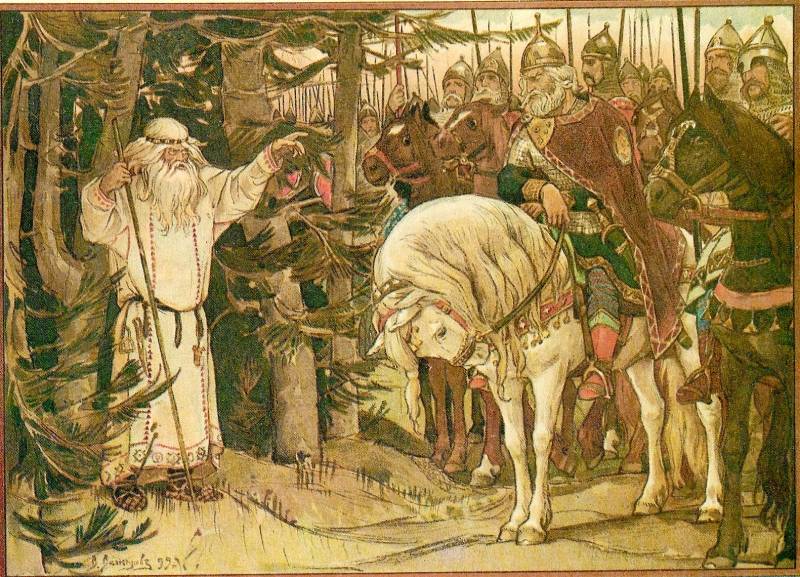
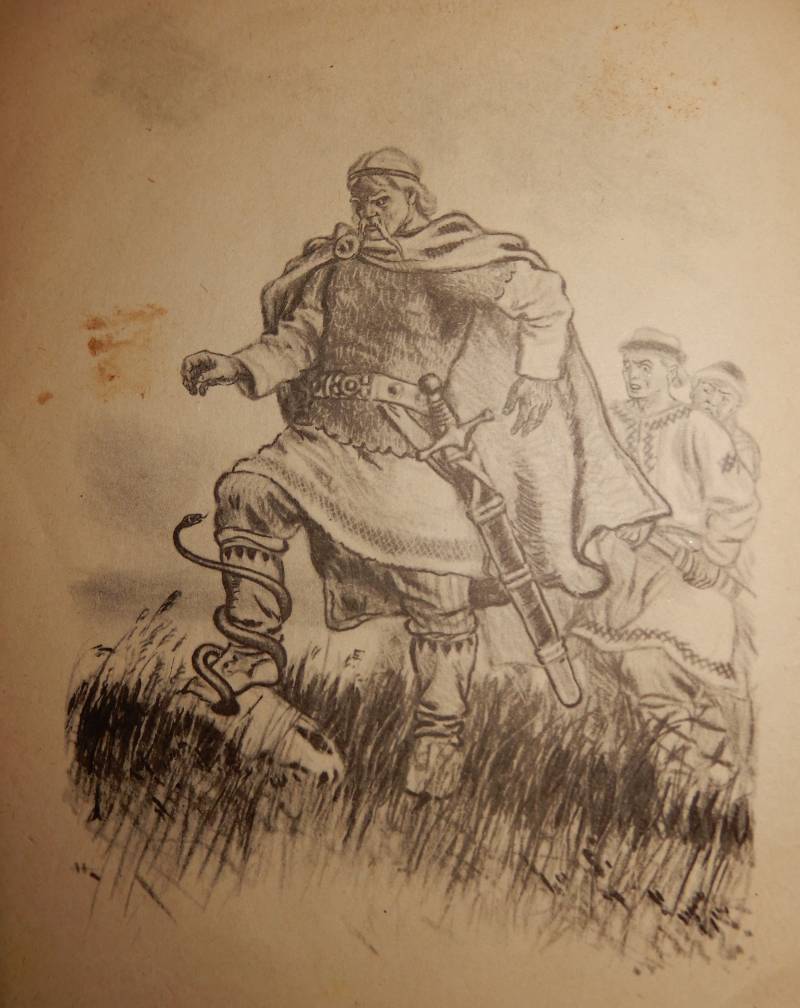
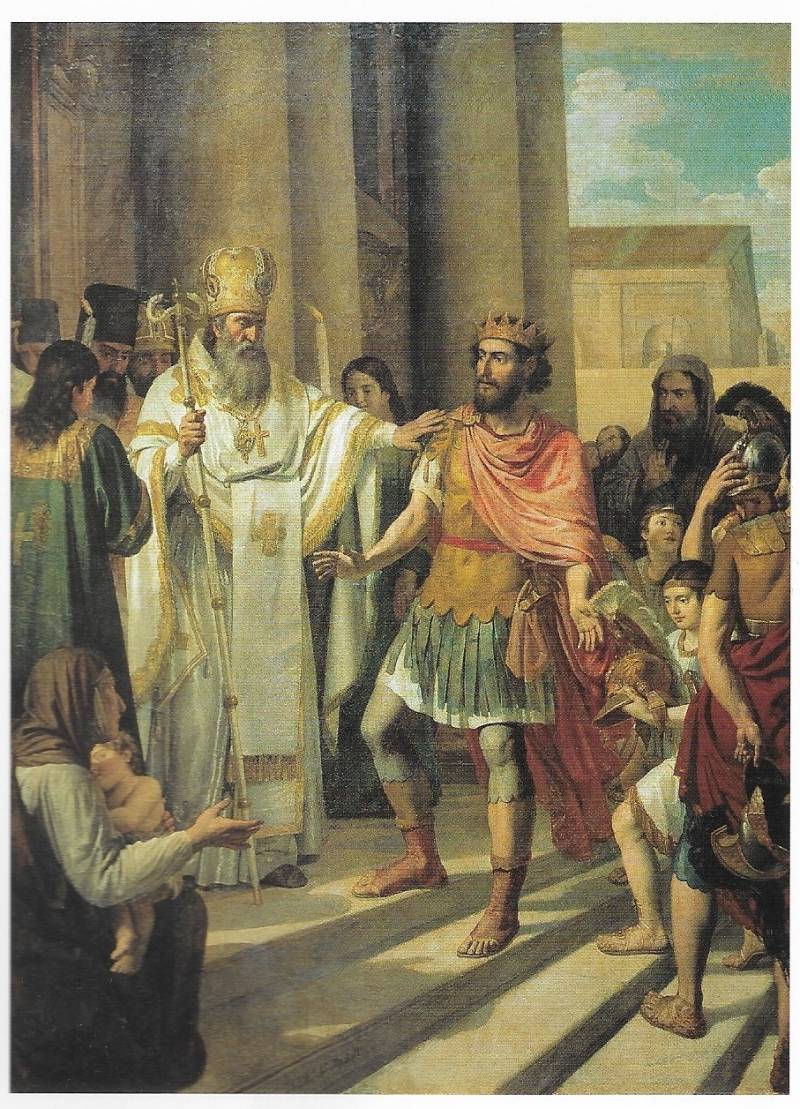
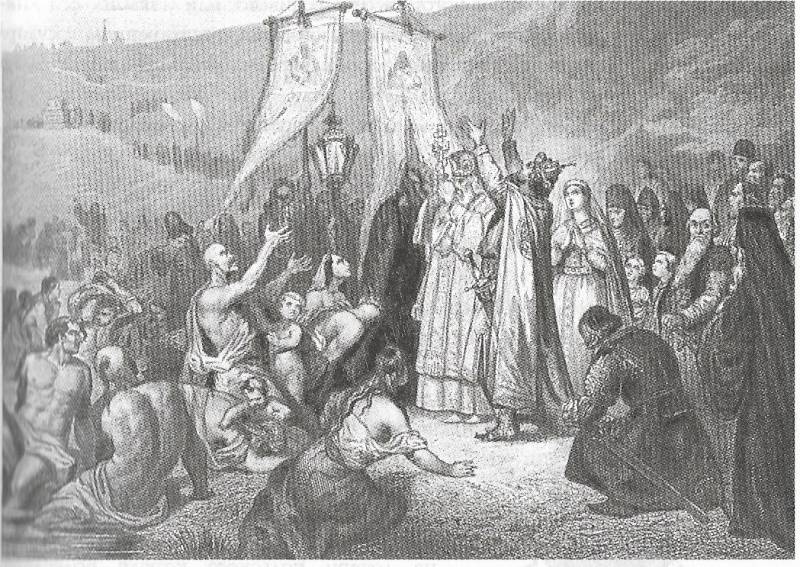
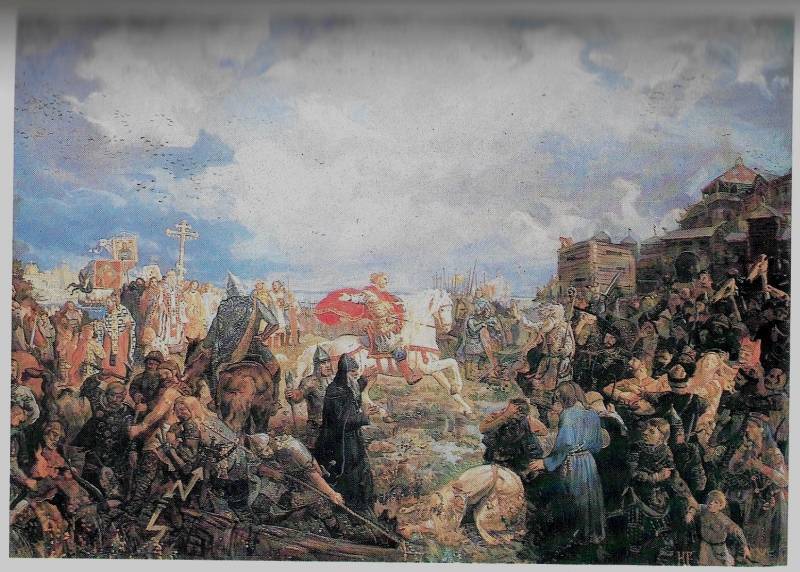
Information